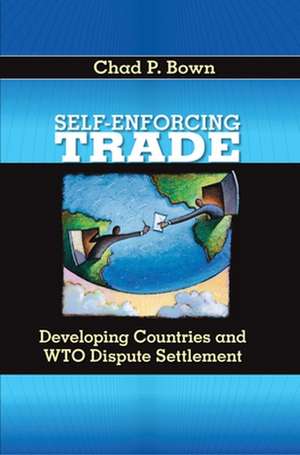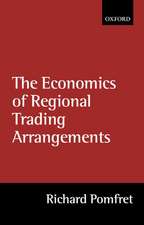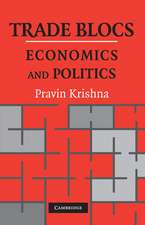Self-Enforcing Trade: Developing Countries and WTO Dispute Settlement
Autor Chad P. Bownen Limba Engleză Paperback – 3 noi 2009
The World Trade Organization—backbone of today's international commercial relations—requires member countries to self-enforce exporters' access to foreign markets. Its dispute settlement system is the crown jewel of the international trading system, but its benefits still fall disproportionately to wealthy nations. Could the system be doing more on behalf of developing countries? In Self-Enforcing Trade, Chad P. Bown explains why the answer is an emphatic "yes."
Bown argues that as poor countries look to the benefits promised by globalization as part of their overall development strategy, they increasingly require access to the WTO dispute settlement process to protect their trading interests. Unfortunately, the practical realities of WTO dispute settlement as it currently stands create a number of hurdles that prevent developing countries from enjoying the trading system's full benefits. This book confronts these challenges.
Self-Enforcing Trade examines the WTO's "extended litigation process," highlighting the tangle of international economics, law, and politics that participants must master. He identifies the costs that prevent developing countries from disentangling the self-enforcement process and fully using the WTO system as part of their growth strategies. Bown assesses recent efforts to help developing countries overcome those costs, including the role of the Advisory Centre on WTO Law and development focused NGOs. Bown's proposed Institute for Assessing WTO Commitments tackles the largest remaining obstacle currently limiting developing country engagement in the WTO's selfenforcement process—a problematic lack of information, monitoring, and surveillance.
Bown argues that as poor countries look to the benefits promised by globalization as part of their overall development strategy, they increasingly require access to the WTO dispute settlement process to protect their trading interests. Unfortunately, the practical realities of WTO dispute settlement as it currently stands create a number of hurdles that prevent developing countries from enjoying the trading system's full benefits. This book confronts these challenges.
Self-Enforcing Trade examines the WTO's "extended litigation process," highlighting the tangle of international economics, law, and politics that participants must master. He identifies the costs that prevent developing countries from disentangling the self-enforcement process and fully using the WTO system as part of their growth strategies. Bown assesses recent efforts to help developing countries overcome those costs, including the role of the Advisory Centre on WTO Law and development focused NGOs. Bown's proposed Institute for Assessing WTO Commitments tackles the largest remaining obstacle currently limiting developing country engagement in the WTO's selfenforcement process—a problematic lack of information, monitoring, and surveillance.
Preț: 276.55 lei
Nou
Puncte Express: 415
Preț estimativ în valută:
52.92€ • 57.47$ • 44.46£
52.92€ • 57.47$ • 44.46£
Carte tipărită la comandă
Livrare economică 23 aprilie-07 mai
Preluare comenzi: 021 569.72.76
Specificații
ISBN-13: 9780815703235
ISBN-10: 0815703236
Pagini: 282
Ilustrații: Illustrations
Dimensiuni: 152 x 229 x 23 mm
Greutate: 0.43 kg
Editura: Brookings Institution Press
Colecția Brookings Institution Press
ISBN-10: 0815703236
Pagini: 282
Ilustrații: Illustrations
Dimensiuni: 152 x 229 x 23 mm
Greutate: 0.43 kg
Editura: Brookings Institution Press
Colecția Brookings Institution Press
Notă biografică
Chad P. Bown is a fellow in Global Economy and Development at the Brookings Institution and an associate professor in the Department of Economics and International Business School at Brandeis University.
Descriere
The World Trade Organization—backbone of today's international commercial relations—requires member countries to self-enforce exporters' access to foreign markets. Its dispute settlement system is the crown jewel of the international trading system, but its benefits still fall disproportionately to wealthy nations. Could the system be doing more on behalf of developing countries? In Self-Enforcing Trade, Chad P. Bown explains why the answer is an emphatic "yes."
Bown argues that as poor countries look to the benefits promised by globalization as part of their overall development strategy, they increasingly require access to the WTO dispute settlement process to protect their trading interests. Unfortunately, the practical realities of WTO dispute settlement as it currently stands create a number of hurdles that prevent developing countries from enjoying the trading system's full benefits. This book confronts these challenges.
Self-Enforcing Trade examines the WTO's "extended litigation process," highlighting the tangle of international economics, law, and politics that participants must master. He identifies the costs that prevent developing countries from disentangling the self-enforcement process and fully using the WTO system as part of their growth strategies. Bown assesses recent efforts to help developing countries overcome those costs, including the role of the Advisory Centre on WTO Law and development focused NGOs. Bown's proposed Institute for Assessing WTO Commitments tackles the largest remaining obstacle currently limiting developing country engagement in the WTO's selfenforcement process—a problematic lack of information, monitoring, and surveillance.
Bown argues that as poor countries look to the benefits promised by globalization as part of their overall development strategy, they increasingly require access to the WTO dispute settlement process to protect their trading interests. Unfortunately, the practical realities of WTO dispute settlement as it currently stands create a number of hurdles that prevent developing countries from enjoying the trading system's full benefits. This book confronts these challenges.
Self-Enforcing Trade examines the WTO's "extended litigation process," highlighting the tangle of international economics, law, and politics that participants must master. He identifies the costs that prevent developing countries from disentangling the self-enforcement process and fully using the WTO system as part of their growth strategies. Bown assesses recent efforts to help developing countries overcome those costs, including the role of the Advisory Centre on WTO Law and development focused NGOs. Bown's proposed Institute for Assessing WTO Commitments tackles the largest remaining obstacle currently limiting developing country engagement in the WTO's selfenforcement process—a problematic lack of information, monitoring, and surveillance.















